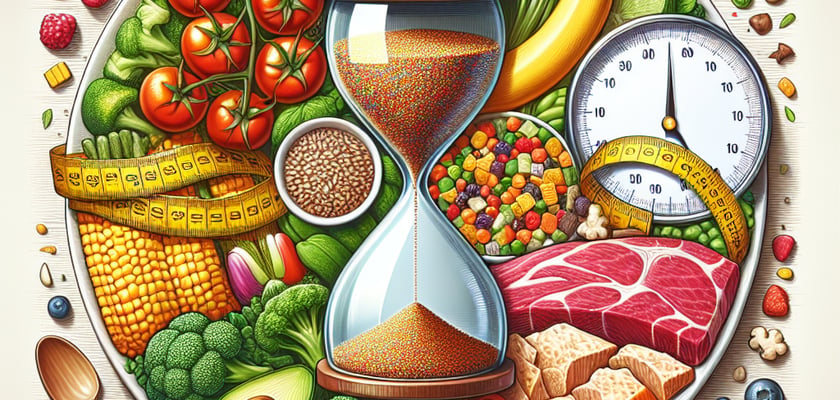Are you ready for the ultimate showdown in the calorie-counting Colosseum, where the gladiators are none other than your very own munchies squaring off against the scale? Well, legend has it that the average human bod needs about 2,000-2,500 calories a day to keep their motor revving like a kitten on catnip. But hold onto your celery sticks, because if you’re on a mission to bid adieu to some snugly pounds, shaking up this caloric cocktail is as essential as your morning cup of joe. It’s a delicate dance of consuming just enough calories so you can say ‘see ya!’ to that extra jiggle without turning into a hangry version of your sweet self.
Now, before you start envisioning calorie numbers doing the tango in your head, let’s lean in and whisper the secrets of savvy snacking and masterful meal planning. In the upcoming key takeaway telenovela, we’re going to delve deep into the delicious details of shrinking your waist without expanding your woes. We’ll gab about gauging the right amount of calories that’s tailored tighter than skinny jeans on a fashionista, specific to your own fabulous form. Let’s not spoil the appetite for what’s to come, though, because you’re about to get schooled in the art of eating enough to keep your metabolism humming a happy tune while your fat cells wave the white flag. Stay tuned, for the calorie caper continues!
Key points I covered in this post
1. To lose weight, you must create a calorie deficit, meaning you need to consume fewer calories than your body burns daily. The general recommendation for weight loss is reducing your intake by 500 to 1000 calories a day, which typically leads to a safe weight loss of about 1 to 2 pounds per week.
2. Your individual calorie needs depend on various factors including age, gender, weight, height, and physical activity level. Basal metabolic rate (BMR) is a measure of how many calories your body requires at rest to maintain basic physiological functions, and this should be considered when calculating your daily caloric needs.
3. Physical activity is an important component of weight loss and it impacts how many calories you can consume while still losing weight. Engaging in regular exercise increases the number of calories you burn, which can allow for a more flexible diet or contribute to a greater calorie deficit.
4. It’s also essential to focus on the nutritional quality of the food you eat, not just calorie content. A diet rich in whole, nutrient-dense foods like fruits, vegetables, whole grains, and lean proteins can promote weight loss and improve overall health.
5. Constantly monitoring your progress and adjusting your calorie intake is vital, as weight loss can lead to a decreased BMR which means your body requires fewer calories over time. Use tools such as food diaries, calorie-counting apps, and periodic consultations with a dietitian or nutritionist to stay on track with your goals.
Identifying Your Caloric Deficit for Weight Loss
What is the optimal daily caloric intake to facilitate weight reduction? To shed pounds, you need to consume fewer calories than your body expends. This principle is known as a caloric deficit. An average woman might start with a guideline of consuming approximately 1,500 calories per day to lose one pound of weight per week, while an average man might start at 2,000 calories per day. These figures are based on the general calorie needs of each gender and can vary depending on age, activity level, and individual metabolism. **A suggested caloric deficit of 500 to 1,000 calories per day can result in a safe and sustainable weight loss of 1 to 2 pounds per week.**
Understanding Basal Metabolic Rate (BMR)
Your Basal Metabolic Rate (BMR) is the number of calories your body requires at rest to maintain basic physiological functions. This measurement is crucial for establishing a starting point for your weight loss calorie intake. To calculate your BMR, several formulas can be used, such as the Harris-Benedict equation or the Mifflin-St Jeor equation. These calculations factor in age, sex, weight, and height, but they do not account for physical activity, which must be included separately when determining your daily caloric needs.
Incorporating Physical Activity Levels
Adjusting your caloric intake based on your level of physical activity is essential for effective weight loss. The Total Daily Energy Expenditure (TDEE) includes all the calories burned through exercise, work, and any additional movement throughout the day. Knowing your TDEE helps you to better understand how many calories you need to consume to lose weight. Generally, exercise increases the number of calories you can eat while still maintaining a deficit. However, overestimating the calories burned during physical activity is a common mistake that can hinder weight loss progress.
Macronutrient Balance and Weight Loss
While calorie count is important, the quality of the calories is equally vital. A balance of macronutrients—proteins, carbohydrates, and fats—is necessary for a healthy diet. Protein can help preserve muscle mass while losing weight and may also aid in satiety. Consuming high-fiber carbohydrates like whole grains can also help with feeling full and provide sustained energy. Healthy fats are essential for nutrient absorption and should also be included. Adjusting your macronutrient ratio can help you not only lose weight but also ensure that your diet is nutritious and sustainable.
Meal Planning and Calorie Tracking
To stay within your calorie goals, planning meals and snacks in advance can be very helpful. Consistently tracking what you eat using food diaries or apps provides visibility and accountability. It’s important to be as accurate as possible when logging food intake. Measuring portions and reading food labels can prevent inadvertent overeating and can help maintain the caloric deficit needed for weight loss.
Strategies for Dealing with Hunger
Reducing calorie intake can often lead to increased feelings of hunger. Drinking plenty of water, eating high-volume, low-calorie foods like vegetables and fruits, and including protein and fiber in every meal can help mitigate hunger. Additionally, distinguishing between true hunger and psychological cravings is critical for sticking to your weight loss plan.
Adjusting Calorie Intake Over Time
As you lose weight, your calorie needs will typically decrease. Regularly reassessing your BMR and TDEE, and adjusting your calorie intake accordingly, is necessary for continued weight loss. Plateaus in weight loss are common and may signal a need to further reduce calories or increase physical activity.
What Are Some Effective Tips for Counting Calories and Losing Weight?
- Use a food tracking app or journal to monitor your daily caloric intake closely.
- Prepare meals at home to control ingredients and portion sizes better.
- Incorporate regular physical activity into your routine to increase calorie burn.
- Eat slowly and mindfully to recognize your body’s satiety signals.
- Ensure a balanced diet by including a variety of food groups in your meals.
- Seek professional advice from a nutritionist or dietitian if possible.
- Regularly check your weight and body measurements to monitor your progress.
“`html
What is the average calorie deficit needed to lose weight?
To lose weight, most people need to create a calorie deficit, meaning they consume fewer calories than they burn. A common approach is aiming for a deficit of 500 to 1000 calories per day, which can lead to a safe and sustainable weight loss of about 1 to 2 pounds per week. However, the exact deficit needed can vary based on factors such as age, sex, weight, height, and activity level.
Can I eat more calories if I exercise?
Yes, if you exercise, you burn additional calories which can technically allow you to eat more and still maintain a calorie deficit. However, it’s important not to overestimate the calories burned through exercise. It’s a common mistake to consume more calories than exercised off, which can halt or reverse weight loss progress. Always balance your calorie intake with your physical activity levels for optimal weight loss.
How do I calculate my daily calorie needs for weight loss?
To calculate your daily calorie needs for weight loss, you first need to know your basal metabolic rate (BMR), which is the number of calories your body requires at rest to maintain basic physiological functions. Various online calculators or formulas, such as the Harris-Benedict equation, can estimate your BMR. From there, you factor in your level of physical activity to find your total daily energy expenditure (TDEE). Subtracting 500-1000 calories from your TDEE can then give you a goal for weight loss.
Are all calories the same when it comes to weight loss?
No, not all calories are the same concerning weight loss. While the number of calories you consume matters, the quality of those calories is equally important. Caloric intake from whole foods that are nutrient-dense, such as fruits, vegetables, lean proteins, and whole grains, can have different effects on your hunger, hormones, and metabolism compared to calories from processed foods high in sugar and unhealthy fats.
How frequently should I re-evaluate my calorie needs while losing weight?
As you lose weight, your body requires fewer calories to function, meaning you’ll need to reassess your calorie intake regularly to continue losing weight. A good rule of thumb is to re-evaluate your calorie needs every 5 to 10 pounds lost or around every month. This will help ensure you continue to create a calorie deficit suitable for your new weight.
Final Thoughts
Understanding how many calories you should eat a day to lose weight is a crucial step in a successful weight loss journey. While the specifics can vary from person to person, following the general rule of creating a calorie deficit will put you on the right track. Remember, consistency is vital, and making gradual changes can be more sustainable in the long run than drastic alterations to your diet.
Don’t forget the importance of nutrition quality, not just calorie quantity. Consuming a balanced diet rich in whole foods can improve your overall health while supporting weight loss. Combining these dietary strategies with regular physical activity will amplify your results and contribute to maintaining a healthy weight over time. Weight loss is a personal journey, and finding what works best for your body and lifestyle is essential for long-term success.
“`

